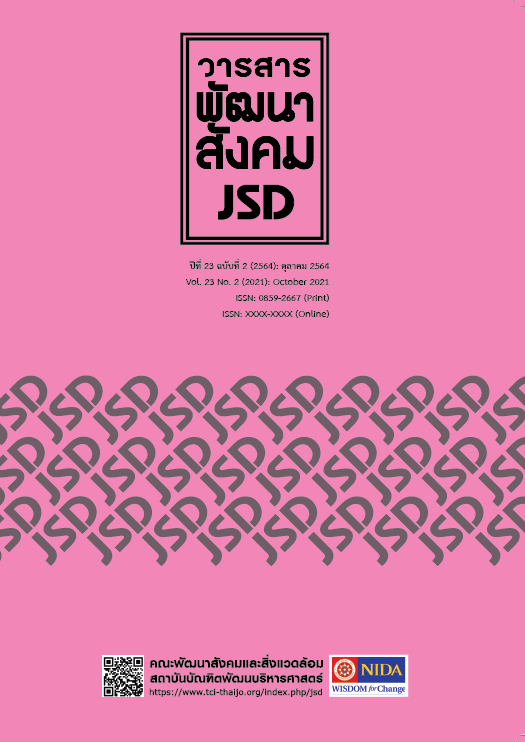Project Evaluation of the Community Model for Quality of Life Improvement according to New Theory Applied to “Khok Nong Na Model” in Sawankhalok District, Sukhothai Province
Main Article Content
Abstract
Article Details
References
Community Development Department. (2020). Guidelines for Operation of the Community Model for Quality of Life Improvement according to New Theory Applied to “Khok Nong Na Model” Project. [In Thai]. Retrieved July 1, 2021 from https://district.cdd.go.th/banfang/wp-content/uploads/sites/
Cronbach, Lee. J. (1990). Essentials of psychological testing. 5 th ed. New York : Harper & Row.
Dhammadinno, N., & Vajirapanno, D. (2021). Promoting the Development of Agriculture the New Theory of the King’s Science with Sangahavatthu 4. [In Thai]. Pañña Panithan Journal, 6(1), 29-40.
Inprom, C. (2018). Sufficiency and the New Theory applied to a One-Rai Plot of Land Generating an Income of 100,000 Baht. [In Thai]. Journal of Social Development, 20(2), 1-15.
Jaitiang, T. (2018). The Process of Learning and Transferring Knowledge of the Community towards Sufficiency Economy Philosophy in Phra Naknon District, Bangkok.
[In Thai]. Patanasilpa Journal, 2 Supplement (June 2018), 315-326.
Jeepet, S. (2020). Assessment of Social Activities Based on the Philosophy of Sufficiency Economy Project Using CIPP Model Bodindecha (Sing Singha Seni) Nonthaburi School. [In Thai]. Journal of Chandrakasemsarn, 26(1), 103-116.
Jutaviriya, K., & Lapanun, P. (2014). Integrated Agriculture: Livelihood Strategies of Isan Farmers under Globalization. [In Thai]. Journal of Mekong Societies, 10(3), 25-48.
Kaewmanee, J. (2014). Community based tourism management in the philosophy of Sufficiency Economy, Ban Hua Khao, Pak Tho, Ratchaburi. (Master's thesis). Graduate School: Silpakorn University. Nakorn Pathom.
Khatasombun, H. (2020). Community Potential Development to Create Sustainable Economic Foundations: Case Study of Noen Sala Subdistrict, Krok Phra District, Nakhon Sawan Province [In Thai]. Journal of MCU Peace Studies, 8(2), 474-488.
Nasom, K. (2016). Evaluation of the Sufficiency Economy Learning Center Project in the Sufficiency Economy of the Government in Lopburi Province. [In Thai]. Journal of Pacific Institute of Management Science, 2(2), 1-12.
Na Thalang, E. (1997). Folk wisdom of the four regions: the way of life and learning process of Thai villagers [In Thai]. Kittimethi Project, School of Educational Studies, Sukhothai Thammathirat Open University, Nonthaburi.
National Electronics and Computer Technology Center. (2017). Khok Nong Na Model.
[In Thai]. Retrieved July 1, 2021 from https2017://www.nectec.or.th/news/news-pr-news/khoknongna.html
Phuengphun, P. (2012). Evaluation of the Chaipattana Vocational park, Nakorn Pathom. (Master's thesis). Graduate School: Silpakorn University, Nakorn Pathom.
Ponsri, S. (2010). Theories and principles of community development. (6th ed). Bangkok: Odeon Store.
Rueangsri, W., Tipyan, C.,& Dam-orn, N. (2020). Science of the King Science of Land the Science of “Community Development”. [In Thai]. Journal of MCU Nakhondhat, 7(12), 264-279.
Sakaro (Ketsakorn), K., & Sudhikhambhirayan, P. (2020). Integrating Buddhism and Progressive Development with New Theory of Agriculture. [In Thai]. Journal of Modern Learning Development, 5(4), 185-195.
Sanrode, S. (20160. The Evaluation of Life Quality Development Project on Community Level, Pattani Province. (Master's thesis). Prince of Songkla University. Songkla.
Sirirat, S. (2015). The Evaluation of Benjavithi Created with the Saiyairak’s Family Template the Learning Center under Family Love Bonding Project, Ratchaburi. [In Thai]. Veridian E-Journal, Slipakorn University, 8(2), 2236-224.
Sisakaew, M. (2020). Science of the King: New Theory of Agriculture in the Form “Khok Nong Na Model”. [In Thai]. Interdisciplinary Management Journal, Faculty of Management Science, Buriram Rajabhat University, 4(2), 31- 40
Srimahawaro, K. (2014). The Evaluation of the Participatory Program for BanSraBua Students’ Families to Put the Sufficiency Economy Philosophy into Practice.
[In Thai]. Narkbhutparitat Journal Nakhon Si Thammarat Rajabhat, 6(2), 113- 122.
Thongkamkaew, W., & Chakkrapopyodhin, C. (2016). New Theory Agriculture on Sufficiency Economy Principle as Moderator between Government Policy and Solution of Hevea Brasiliensis Crisis in the Southern Part of Thailand. [In Thai]. Journal of Research for Development Social and Community, Rajabhat Maha Sarakham University, 3(7), 128-148.
Tobua, S., Khemtong, P., & Thammakittipob, V. (2018). Evaluation Communities Development Strategy Plan to Practice with Responsive Evaluation Model Approach. [In Thai]. Journal of Humanities and Social Sciences Thonburi University, Special Issue (12), 163-173.
Thailand Development Research Institute. (2021). The social impact of the COVID-19 outbreak New ripples and measures that should be taken. [In Thai]. Retrieved July 11, 2021 from https://tdri.or.th/2021/01/impact-of-new-covid-19-wave/
Wongnasri, P., & Promjuk, W. (2020). The King’s Philosophy and Local Development.
[In Thai]. Journal of MBU Lanna, 27(2), 139-146.


